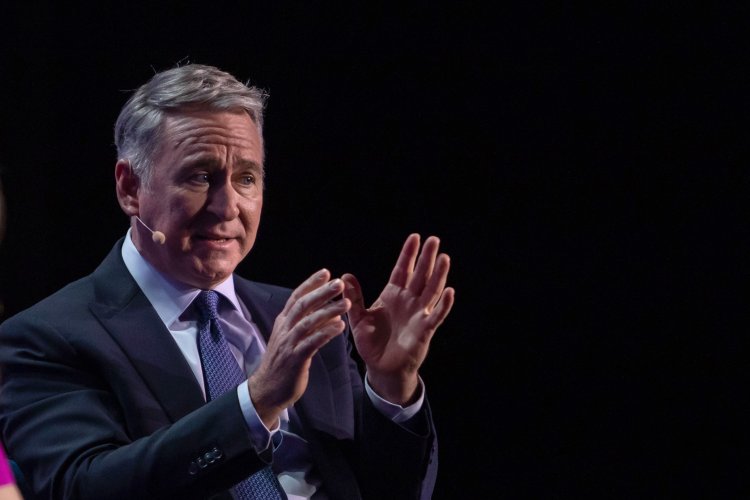'Condemns Trump trade war': GOP megadonor Griffin criticizes 'crony capitalism'
The frustration expressed by the founder of Citadel regarding the president’s policies highlights widespread worries among executives about the potential impact of the trade war on the economy.

“Tariffs open the doors to crony capitalism. The government starts to pick winners and losers,” said Ken Griffin, the founder of Citadel, during an interview at the Beverly Hilton, part of the Milken Institute’s Global Conference. “I thought that would play out over the course of years. It's terrifying to watch this play out over the course of weeks.”
He further elaborated that the administration’s inconsistent exemptions for certain products and industries indicate that "we have roughly already — regretfully — unleashed an era of crony capitalism."
Griffin's discontent with Trump’s approach mirrors wider concerns at the conference regarding the potential negative impact of the trade conflict on the U.S. economy. For the Wall Street and industry elites present at Milken, Trump’s moves to dismantle global trade structures are causing them to adapt, albeit uneasily, to policies they believe will hinder capital flow to U.S. businesses and negatively affect consumers. This apprehension among financial leaders creates a significant challenge for the president, as he relies on their support to advance his agenda.
As attendees gathered in the hotel’s Oasis pavilion for an afternoon concert by Nile Rodgers and Chic, Griffin shared how his initial support for Trump 2.0 diminished as the president's trade strategies began to take effect. The billionaire, who had previously warned that such policies could “tarnish” the dollar's reputation, noted that the currency's recent decline is set to weaken American consumers' purchasing power.
“Whether it's a flat-screen TV or a new laptop, your dollar is just not going to go as far,” he asserted. “This starts unfolding in the next couple weeks.”
Michael Milken’s annual gathering has historically been a platform for advocates of free trade and globalization. Although many industry leaders on the main stage expressed caution over potential adverse effects of trade policies, Griffin stood out by addressing his critique from the perspective of the American consumer.
“We all want to see the president succeed, whether you're in business and you're Republican, or you're a business and you're a Democrat. We need the president to succeed,” he emphasized. “There's that fine line between constructive criticism and just being toxic.”
In response, White House spokesperson Kush Desai stated that “the biggest beneficiaries of President Trump’s America First agenda of tariffs, tax cuts, and deregulation are American workers. President Trump delivered historic middle-class wage and job growth in his first term by leveling the playing field and delivering tax relief, and he’s set to do so again in his second term.”
While Griffin has previously criticized Trump, his recent comments have reportedly unsettled officials within the administration, as shared by individuals familiar with the discussions. Although Griffin remains influential in Republican circles, his public discontent illustrates a significant rift between traditional market advocates and the populist faction within the GOP.
“I think that they're frustrated that much of what I said is self-evident,” Griffin remarked about his interactions with the White House. “It's been a moment in time where I think people have been reluctant to raise their voices, and I think that the debate is key.”
Many financial leaders attending Milken were careful to offer praise for Trump and Treasury Secretary Scott Bessent before expressing specific apprehensions. Griffin mirrored this approach during a Q&A, recognizing Bessent's recent remarks as laying out a “vision for how to reignite growth in the United States.” However, he directly critiqued this vision, which Bessent described as an “interlocking” pro-growth strategy combining tariffs, tax cuts, and deregulation, suggesting that the pace of deregulation and the prospects of extending a 2017 tax cut may not sufficiently counterbalance economic drag.
His observations highlight the hesitation among many on Wall Street to openly oppose Trump’s tariff policies. While several leaders on the main stage discussed the strength of U.S. businesses and markets, conversations in more private settings focused on concerns that the immediate impacts of Trump’s tariff and foreign policies could lead the U.S. toward recession.
“The investor population here is underestimating the trade headwinds we have post-Liberation Day,” stated Dan Tannebaum, who leads the global anti-financial crime practice at consulting firm Oliver Wyman. “The conversations I’ve had in the last few days — the ones behind closed doors — have to do with how the U.S. is overplaying its hand.”
Bridget Gainer, the global head of public affairs and policy at Aon and a Cook County commissioner, recounted an informal poll at a private dinner where 17 of 20 attendees expressed concern about an impending economic contraction. David Steinbach, Hines’ global chief investment officer, stated in an interview that “in many ways, the recession is probably already here,” suggesting tariffs will drive up construction costs and housing prices for consumers. He posited that “deglobalization is here to stay” and noted, “even if the White House secures new trade deals, once you squeeze all the toothpaste out of the bottle, you can't get it all back in.”
Nevertheless, the administration has its supporters. IBM Vice Chair Gary Cohn told attendees, “we’re going to come out of this just fine.”
“We’ve lived through depressions. We’ve lived through recessions. We lived through the financial crisis,” Cohn asserted, underscoring the resilience demonstrated in past challenges. “Every time, when we thought it was really bad, it got a lot better.”
While Trump’s policies may provide advantages to certain domestic sectors and manufacturers, many industry figures are increasingly focused on the potential immediate risks. A survey by consulting firm EY-Parthenon revealed that 98 percent of global CEOs are concerned that higher tariffs will impact their operations and sales within the next year.
An anonymous Wall Street leader reported that leaders of private equity and asset management firms had privately articulated their anxieties to Bessent. However, there appears to be a consensus that the president's firm stance on trade can only be moderated to a limited extent.
Furthermore, there was widespread acknowledgment at Milken that new trade barriers affecting U.S. markets are likely permanent.
Trump's 90-day "pause" on reciprocal tariffs will end in two months, and Andrea Guerzoni, EY-Parthenon Global Vice Chair, noted it usually takes years to negotiate new trade agreements.
If the recent “Liberation Day” tariff announcements signal the start of a “more draconian, violent rewiring of the entire global economy,” he cautioned that predicting changes in financial markets could become significantly more complex.
“I like optimism,” he concluded. “But I also like realism.”
Allen M Lee for TROIB News
Find more stories on Business, Economy and Finance in TROIB business












